Indices at the Dawn of the Internet Age
The funniest possible thing for me to do immediately after starting a newsletter would be, in the sophomore issue, to announce that I was going on summer vacation. However, I wrote this. Thank you for inviting me into your inbox, something that feels surprisingly intimate, just me and the coupons from the Container Store and the daily emails from moral causes that you wholeheartedly support and who ask you for $20 every day.
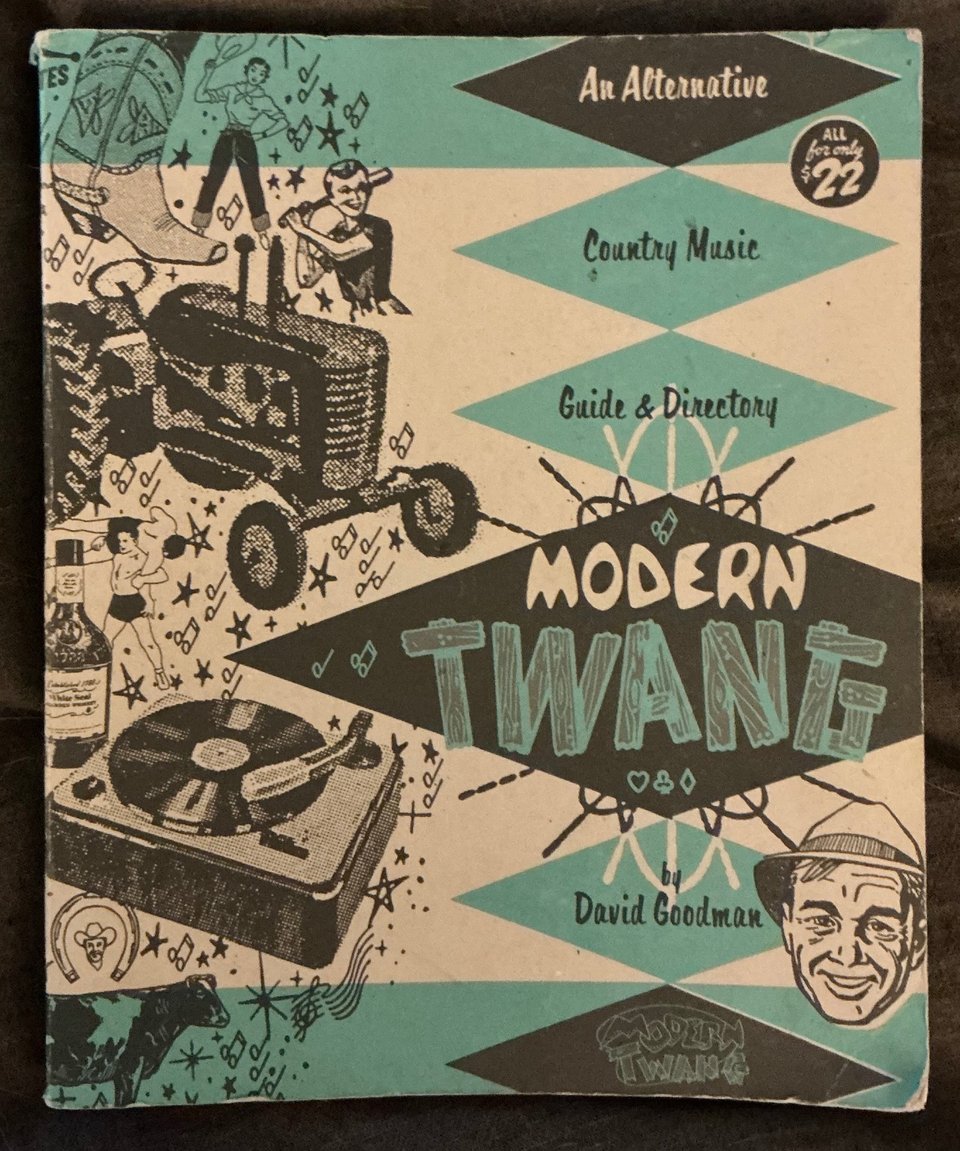
I arrived at the Montclair Book Center twenty minutes before it closed, on Father's Day, after spending an afternoon unable to decide on what I wanted to do until it was almost too late to do anything. I had never been to the store previously and found it satisfactorily dream-like - it's a large used/new bookstore with a labyrinthine structure: multiple staircases, twists, turns, a two-story room centered around children's books, a basement lounge (?) with a couch and an arcade machine. Bookshelves are affixed to the walls like fungus, and on one of these, facing out, I found Modern Twang: An Alternative Country Music Guide and Directory by David Goodman. This thick tome contains 439 pages of capsule profiles of 700 alt-country-aligned acts, from the Chicken Chokers to Buck Naked and the Bare Bottom Boys. These short biographies are accurate as of the publication date of 1999; additional resources in the back of the book include a directory of alt-country-friendly venues throughout the world, radio stations, and - best of all - websites and online mailing lists, with their little URL's all written out for the whole world to see.
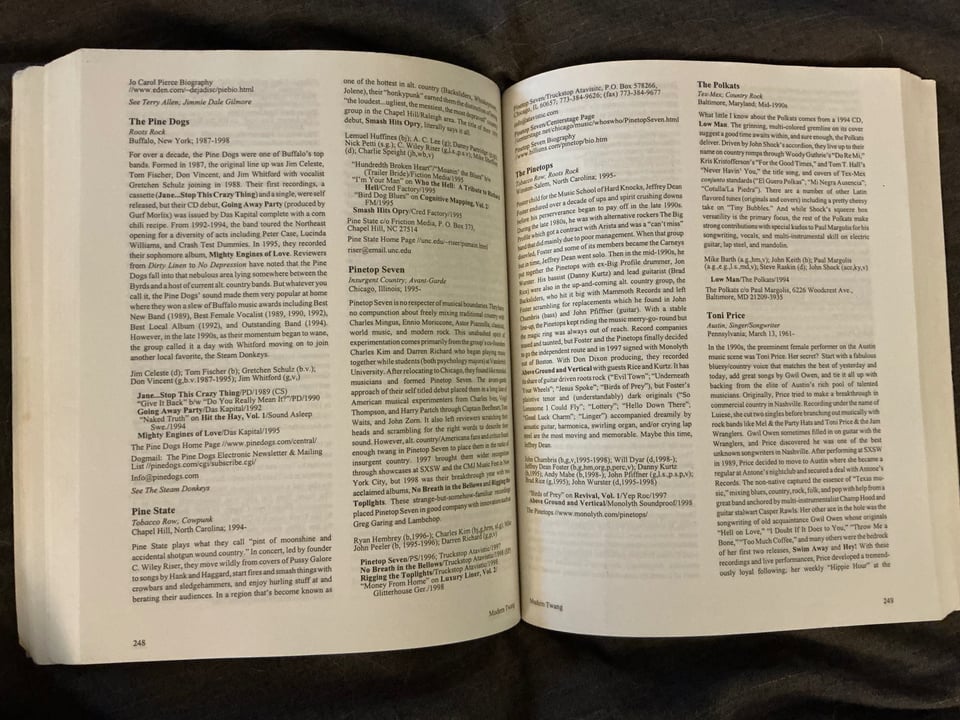
It was impossible for me not to buy the book for a number of reasons, not the least of which being I actually like alt-country. But, formally speaking, a big attraction for me is that it's hard to imagine anything less likely to be produced today. Nobody would write 700 profiles of alt-country musicians and they certainly wouldn't have them made into a book, because - well, why?
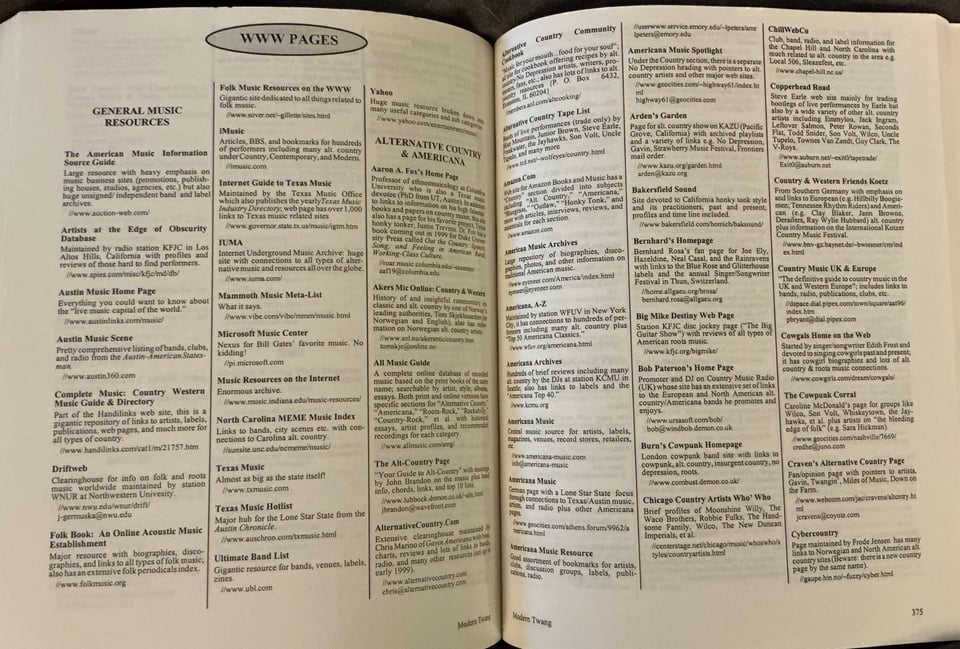
The reason why not has something to do with the internet, but I'm not sure exactly what. I think maybe the argument against making Modern Twang now is that it's just something that someone could build as a website, even though those sorts of compendium-style websites that made up a lot of the early internet - the ones that are listed in the back of Modern Twang, come to think of it - don't really exist any more. I think maybe 1999 was the last time that a person could allow themselves the illusion that they could, personally, write up a definitive guide to every musician in a subgenre, and it might also have been the last time that the idea of collecting all of that information into one place had a certain power. In William Gibson's Pattern Recognition a character says that the internet is "everting" - turning inside out, no longer being localized on our computers but instead existing all around us, like fireflies, and I wonder if we have started to believe, or been sold a lie, that information will ambiently coalesce rather than be collected and organized by devoted, truly weird individuals.
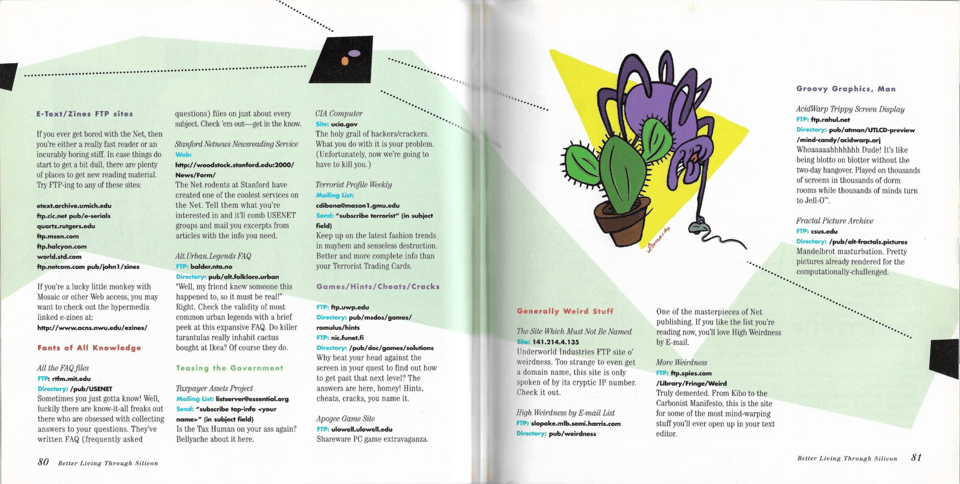
It reminds me of two other tomes that I have owned. The Happy Mutant Handbook is a sort of jumbo-sized zine, published in 1996 and devoted to a kind of Bay Area neo-retro-techno-bohemian lifestyle that doesn't have a modern analogue; the entire book is available as scans here, and I recommend you take a look. In probably 1998 it was misfiled in the humor section of a Barnes & Nobles in Louisville, Kentucky, which is how it fell into my hands and subsequently altered the trajectory of my life. Written by the team behind the bOing bOing "neurozine," which later became a website that was interesting and now has just slowly kind of become banal, there were little pieces on Sun Ra and Timothy Leary and "culture jamming" and Ween and the SCHWA Corporation. There was also a whole section entitled "Net.Weirdness" - internet resources of UFO pictures or mailing lists about alternative comix or Gopher sites about phone phreaking, all of which sounded incredible to 12 year old me and almost all of which was already inaccessible only two years later - a snapshot of an internet that was about to just completely cease to exist.
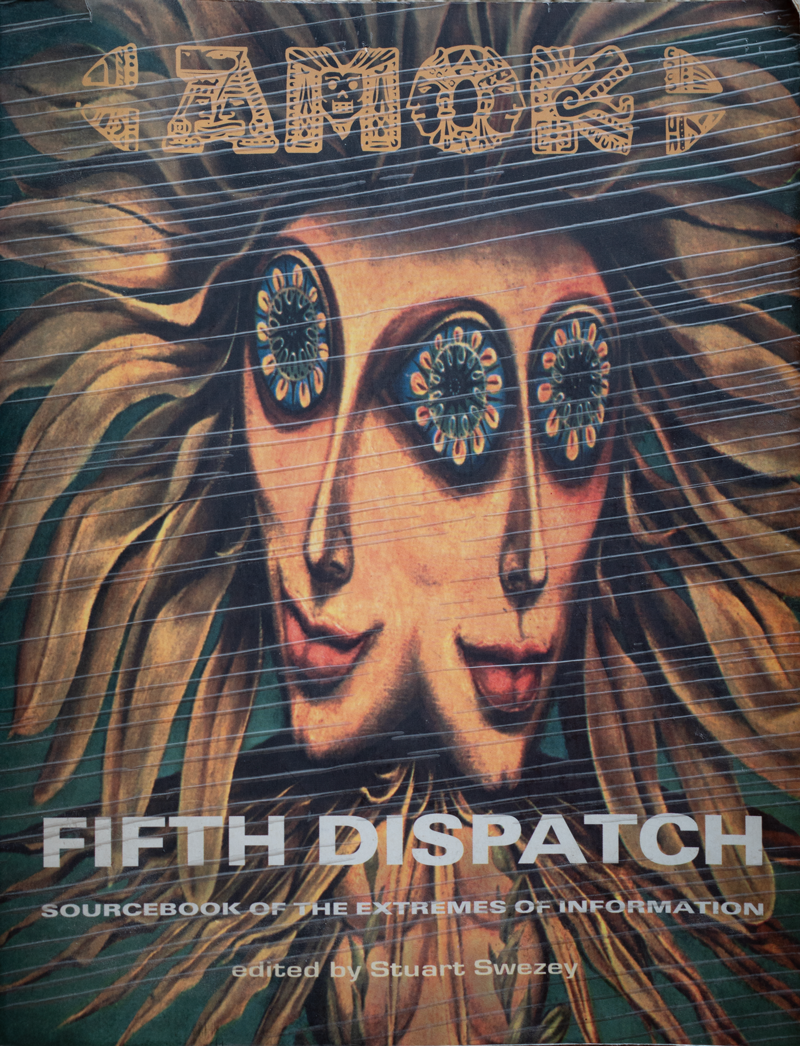
The second is the Amok 5th Dispatch, which I happened upon a few years later and bought because there is a literal one-word reference to AMOK in the Happy Mutant Handbook. The book is a index of other, even weirder books covering topics from the JFK assassination to multiple, contradictory alien cults, many of them self-published or from small publishers, with capsule descriptions and sorted into categories. Also from 1999, it features another section of interesting websites and mailing lists, all of which are long-gone. It's not only difficult to now imagine anyone publishing something like this, it's kind of difficult to imagine the point of view: the sort of intellectually prurient view on crime and murder that the Dispatch and contemporary publications have has been superseded by true crime, while all of the weird alien conspiracy people are just Nazi seed-oil freaks now. It's written firmly from the End of History.
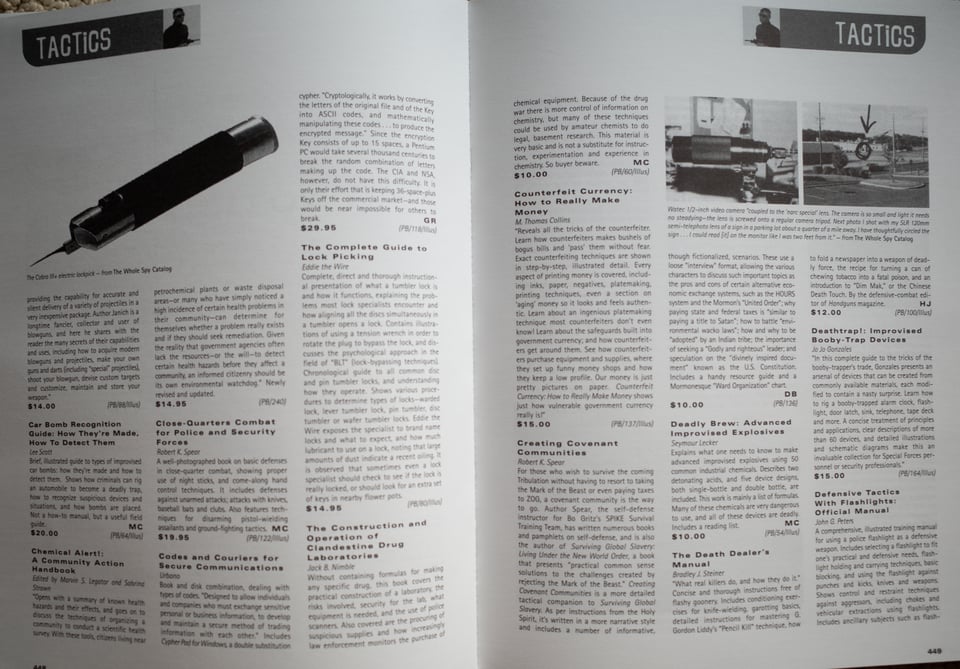
I turned 39 this spring; middle-age looms for me, as it may indeed do for you. I have also found myself professionally and politically depressed - my industry isn't doing well, I have trouble finding meaning in my work, and also, you know, every other aspect of existence. At one point I remembered the concept of a "mid-life crisis," which is very funny to me now, because how could I possibly tell if what I am currently experiencing is a normal developmental phase for a man of middling class and age or a result of, again, everything else. The mid-life crisis is now one more luxury we are denied.
But the difficulty in ascertaining whether what you are experiencing is psychology or history feels especially acute for us now, in these darkly precedented times. Since Jeremiah humans have complained about how debased and stupid society was becoming, and I have kind of taken comfort in that - we can't be really getting that bad if everyone has always thought we were getting bad. And yet, right now, things seem fairly bad. Society does seem debased as hell! And from this perspective it's really difficult to tell if my feelings towards contemporary culture and forms of knowledge are rational or just me getting old. A lot of the flotsam that this letter is dedicated to comes out of ecologies of information that just don't exist any more (or, I'm detached enough from everything that I'm not aware of them), and it's difficult for me to tell if I am missing those forms of knowledge because they're worth anything or because I am currently, viscerally coming to the realization that I am not going to start aging backwards tomorrow.
These types of books don't exist any more - the value of information is just completely different now. You've got to imagine someone, in 1998, who wasn't interested in popular culture, who maybe didn't live in New York or Los Angeles or Chicago and who found out about the things they were interested in largely through mailing people checks or well-concealed cash and getting books or zines or alt-weeklies mailed to them. Of course all of these books had a big section at the end about mailing lists and message boards - it must have felt like opening a third eye. If you ever read about the Chitlin' Circuit or other pre-WW2 music venues you read about nightclubs and concert halls and juke joints in small towns in Kentucky and Alabama and Michigan, places where apparently people would come from miles around for these incredible shows that would last all night and you go to these places now and there's just nothing there and it's difficult to imagine that there ever was - a completely different informational ecosystem.
Was it better? I run into a problem here where, as a straight, white man, how could I ever possibly know. All of these things required money and time and it’s impossible to decouple the availability of easy money and time for people who largely looked like me from an economic system in the mid to late 90s that worked almost exclusively for people who looked like me. I can’t tell if it was better. But I can hold these books and I can think about how this information now lives and dies on Reddit threads and specialist forums and Discords. It will never see print, and my children - even if they are infected with the same strange nostalgias as me - will never find them on the shelves at the Montclair Book Center, may it stand forever.